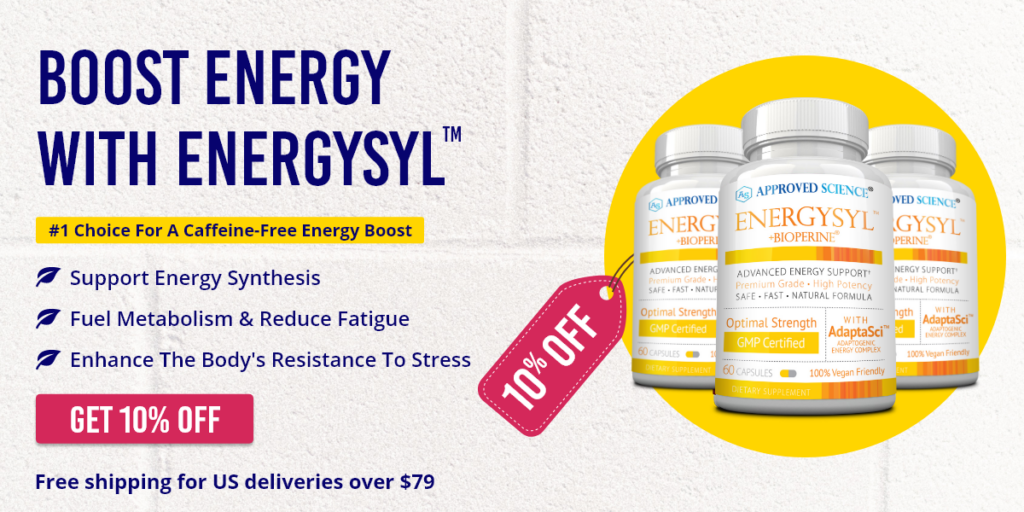The great energy debate has raged for years: which is the best source of energy—energy supplements, caffeine, or sugar? Each option offers its own unique benefits and drawbacks, and the best choice for you depends on your individual needs and preferences. In this blog post, we’ll explore caffeine vs sugar vs energy supplements with the pros and cons of each energy source so you can make an informed decision about what works best for your needs.
Caffeine For Energy
Caffeine does not produce energy. Despite making you feel more energized, caffeine doesn’t actually fuel the body. What it does is block your ability to feel tired. It acts on the brain by blocking the effects of adenosine, a neurotransmitter that signals tiredness. This leads to increased alertness and perceived energy levels. Caffeine also stimulates the central nervous system which may be why it has been shown to improve mental performance, such as reaction time, accuracy, and short-term memory. Additionally, coffee (which is the preferred caffeine source of millions) has been found to offer health benefits such as lowering the risk of depression, protecting against liver disease, supporting heart health, and more.
However, while caffeine is effective in boosting energy in the short-term, it can have some downsides. Caffeine can cause jitters, anxiety, and irritability in some people, and drinking too much can lead to restlessness and difficulty sleeping. Additionally, it may lead to feelings of dependency and withdrawal symptoms when consumed regularly. Therefore, caffeine should be used with caution and not relied upon as an everyday source of energy.
PROS
- Stimulates central nervous system
- Makes you feel more awake
- Fast results
- Health benefits
CONS
- May cause jitters and anxiety
- Does not actually provide energy
- Addictive and can cause dependency

Sugar For Energy
When it comes to a quick boost of energy, there’s no denying that sugar is effective. Sugar supplies the body with glucose, and glucose is the primary metabolic fuel for all cells in the body (1). As soon as you ingest a few spoonful of sugar or a sugary snack, your body gets an instant jolt of energy. But before you reach for that bag of candy or cookie, you should know the cons of using sugar for energy.
First off, most of the sugary snacks that give us an energy boost are highly processed and full of empty calories. Too much sugar can lead to weight gain and other health issues over time. The effects of sugar are also short-term, so if you’re looking for more sustained energy, it’s not your best bet.
PROS
- Fast energy
CONS
- Short-term effects
- Sugar crash
- Addictive
- Excess sugar can cause health issues
Energy Supplements For Energy
There are a few different kinds of energy supplements, many of which provide caffeine or sugar to help you stay alert. However, other energy supplements provide key nutrients to support your body’s energy levels. For example, supplements that ensure your body is fully stocked with B vitamins can boost energy. This is because the body uses B vitamins to produce energy through metabolizing proteins, fats, and carbohydrates. B vitamins also play a role in blood cell formation which is important for delivering nutrients to the cells to maintain their energy and functioning. In addition to B vitamins, many energy supplements contain adaptogens which are natural herbs that have fatigue-fighting properties.
When it comes to energy supplements, the energy-boosting effects are subtler, but longer lasting. Unlike caffeine or sugar, energy supplements are not addictive. Plus, energy supplements can provide health benefits beyond optimizing energy and performance, such as supporting blood health, enhancing cognition, improving mood, and relieving stress.
PROS
- Sustainable energy
- Fights fatigue
- Health benefits
- Not addictive
CONS
- Slower results
Bottom Line
When it comes to caffeine vs sugar, caffeine seems like a clear winner with its health benefits and ability to stimulate the Central Nervous System. While sugar is fine in moderation, excessive consumption and high blood sugar can cause health risks which is why it’s best not to rely on sugar for frequent energy boosts. However, caffeine sources are often paired with sugar to enhance the taste, so unless you’re careful, odds are that when you choose caffeine you’re also choosing sugar. These two energy boosters both deliver quick results but they can be addictive and come with the risk of “crashing” when the effects wear off.
On the other hand, energy supplements don’t cause a “crashing” effect, but their results are more subtle. Rather than giving you a quick pick-me-up, energy supplements give your body the tools to continually “pick-itself-up” and fight off fatigue. Energy supplements, like Energysyl™, can be a great option if you often feel fatigued and need a boost in your overall energy levels.
Between caffeine vs sugar vs energy supplements, the best source of energy for you depends on your individual needs and goals. If you need an immediate boost of energy for a workout, caffeine or sugar may be the better choice. You can also combine caffeine and sugar to get the effects of each. However, if you’re looking for something more sustainable, or want to reduce your dependency on caffeine or sugar, then supplements can provide a good alternative. Before investing in an energy supplement, make sure to consult your doctor and read reviews. At the end of the day, each of these three options can make you feel more awake and you don’t have to choose only one energy booster. Just remember not to overdo it on the caffeine or sugar, and try to get enough sleep each night for a more energized life.


